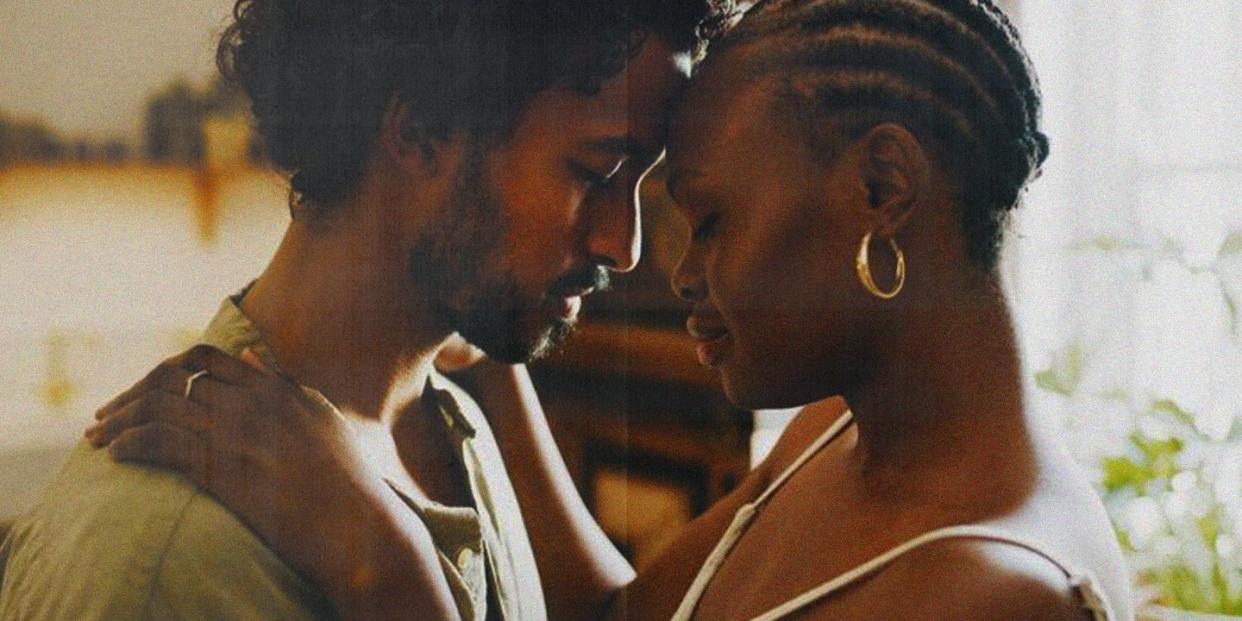Why does TikTok wants us to question *everything* about our relationships?

TikTok is *full* of trends. Remember the tongue-in-cheek 'none of my business' skit, whereby what the back of our hair looks like has literally nothing to do with us? Iconic, yes, but it also highlighted how many of our societal frameworks are still systemically fatphobic. Or how about the 'girl dinner' movement, which originally started off as a charming, funny and totally relatable dialogue but ended up promoting restrictive eating habits? Basically, what I'm trying to say is that TikTok's influence is wild and not all trends are as innocent as we'd like to think/they start out to be.
Cue 'pink flags' - not necessarily a new phenomenon - but one that has quietly swept the platform in terms of its dating content for the last couple of years. In a nutshell, Jessica Alderson, relationship expert and co-founder of the dating app, So Syncd explains that they refer to those little things in a relationship (be it romantic or platonic) that nag at you.
FYI, pink flags aren’t to be confused with beige flags, either. While there’s a slight crossover in terms of their subjectiveness, beige flags sit a little lower on the problematic scale. Urban Dictionary describes them as "something that’s neither good nor bad but makes you pause for a minute when you notice it." I.e. innocuous behaviour like slurping on a coffee or not putting your phone on silent when you go to bed. You know? No biggie.
But in terms of pink flags, if left unaddressed, they could morph into the more well-known red flag territory. Which as we all know, is a relationship breakdown.
While this seems super credible - and more importantly helpful - in terms of navigating who you spend your time with or who you sleep with, I just can't help wondering if some of the 'pink flags' circulating the social realm as of late may be a little - for want of a better word - ridiculous. Not to mention incredibly detrimental to relationships, that before this term came up in conversation were completely fine.

Agreed, some examples - like feeling emotionally unsafe, a history of betrayal, or a lack of communication, as per Alderson - are totally valid. But when things like 'we have never argued' or 'we don't share the same hobbies' are herded into pink flag territory (which I've noticed a number of times), it's hard not to wonder whether TikTok actually wants us to question our relationships. IMO, it seems like the littlest, most generic things have to be labelled or put into boxes when the reality really is - can we simply not just be?
In some respects, Alderson agrees, explaining that while pink flags aren't to be ignored, they aren't necessarily deal breakers, either. "At the end of the day, pink flags don't indicate that your relationship is doomed," she says. In addition, she also details that many are subjective and depend on what you consider to be important in a relationship. "For instance, if someone values frequent communication, then they might see short replies or taking a while to respond to texts as pink flags, while another person may not."
Alderson does add that labelling certain behaviours as pink flags can be both helpful and harmful, depending on how you think about the term. On the one hand, she says using pink flags can be useful, as it allows people to more easily identify and address potential areas of worry in a relationship. "Giving a minor area of concern a specific name can make it easier for people to understand how to work toward finding a solution. Clarity is the first step in finding one," she says.
On the other hand, she explains how it can be damaging if the term is used in a way that implies that minor issues should be ignored or taken lightly. "It's important to remember that even small issues can lead to bigger problems if they aren't addressed."
Equally, she notes some people go the other way and can end up writing off potential partners (or mates) too quickly because of a few minor issues that they have identified as "pink flags." Or, that Tiktok has told them are problems, perhaps?
For Dr Elena Touroni, a consultant psychologist and co-founder of The Chelsea Psychology Clinic, the labelling of generic behaviours as pink flags (see: different hobbies and never argued, two things my partner and I can heavily relate to despite being in a happy, healthy relationship of almost six years) isn't necessary. In terms of the former, she says that "partners don’t necessarily need to share the same interests for a fulfilling, successful relationship." Instead, she says that different hobbies can actually offer each person space to grow and, in some cases, can create a "broader, more exciting dynamic in the relationship."
The latter? Dr Touroni details that not all couples are the same, and some have a "naturally more harmonious way of resolving conflict." "What’s important is not whether you argue, but rather how you handle those disagreements when they come up," she notes.
So why, then, (aside from the very obvious pink flags detailed by Alderson that I'm not disputing, which also include communication imbalance and inconsistent availability) must we put things into boxes? When in fact, a lot of it is just a natural part of life? According to Dr Touroni, as human beings, we have a natural pull towards categorising and labelling things as it helps us make sense of the world. However, she says that "labels can be limiting."

She sums it up: "Every relationship is unique, so we want to avoid trying to box them into predefined notions of what’s 'right' or 'wrong'".
The bottom line for me? While I probably won't be taking relationship advice from TikTok any time soon, I can sympathise with the 'pink flag' term and some of the examples that fall under its umbrella. I'm not averse to it being a genuine concept that, like Alderson says - when addressed early - can help a "relationship continue to grow in a healthy direction," I'm just not into every little thing being classed as a potential problem.
"A healthy relationship is when people are able to mutually get their needs met in a partnership or friendship. All healthy relationships share characteristics like love, trust, support, respect, honesty and communication," Dr Touroni explains. "Being a supportive partner - or friend - is about being there for the other person. By listening, validating, and offering support, you empower the other person to become the fullest expression of themselves."
Tbh, it's just good to know that me preferring a vintage episode of Keeping Up With The Kardashians over my bf's choice of Saturday Kitchen isn't going to send my relationship down the swanny...
You Might Also Like


